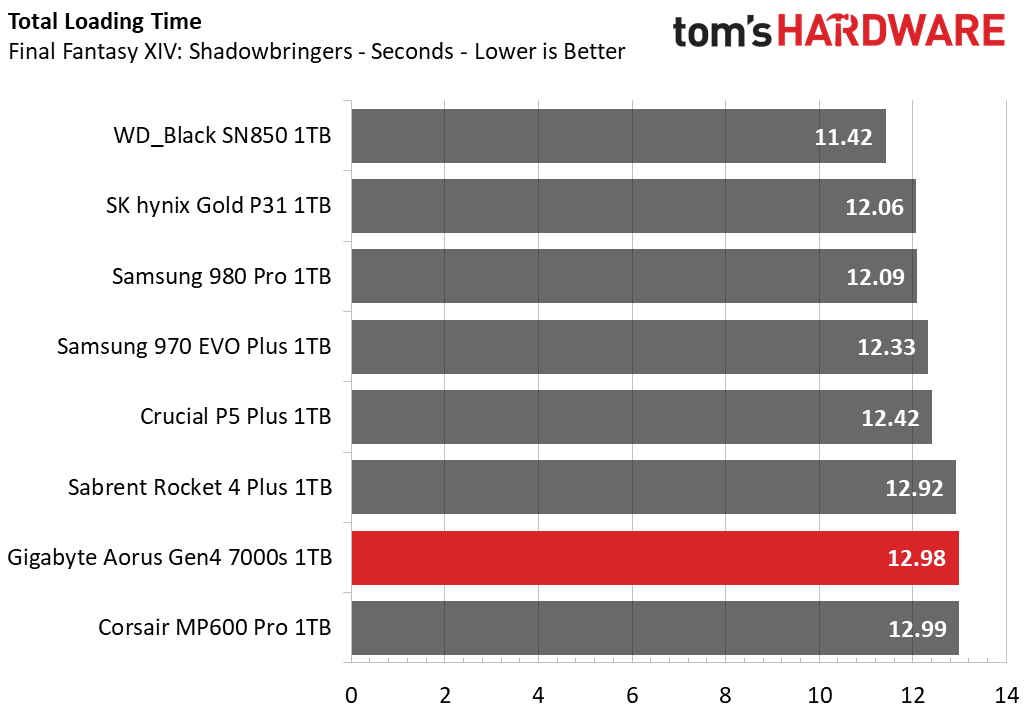Why you can trust Tom's Hardware
Comparison Products
We put Gigabyte’s Aorus Gen4 7000s against a few other Phison E18-based competitors, including the Corsair MP600 Pro and Sabrent Rocket 4 Plus. We also threw in the Samsung 980 Pro, WD_Black SN850, and Crucial P5 Plus as well as a few high-end PCIe Gen3 performers, the Samsung 970 EVO Plus and SK Hynix Gold P31.
Game Scene Loading - Final Fantasy XIV
Final Fantasy XIV Shadowbringers is a free real-world game benchmark that easily and accurately compares game load times without the inaccuracy of using a stopwatch.
Having scored similar to that of the Corsair and Sabrent, the Aorus Gen4 7000s delivered average results for an E18-based SSD with Micron’s 96L TLC flash in this game loading benchmark. It isn’t quite as responsive as the WD_Black SN850 or the Samsung 980 Pro, though.
Transfer Rates – DiskBench
We use the DiskBench storage benchmarking tool to test file transfer performance with a custom dataset. We copy a 50GB dataset including 31,227 files of various types, like pictures, PDFs, and videos to a new folder and then follow-up with a reading test of a newly-written 6.5GB zip file.
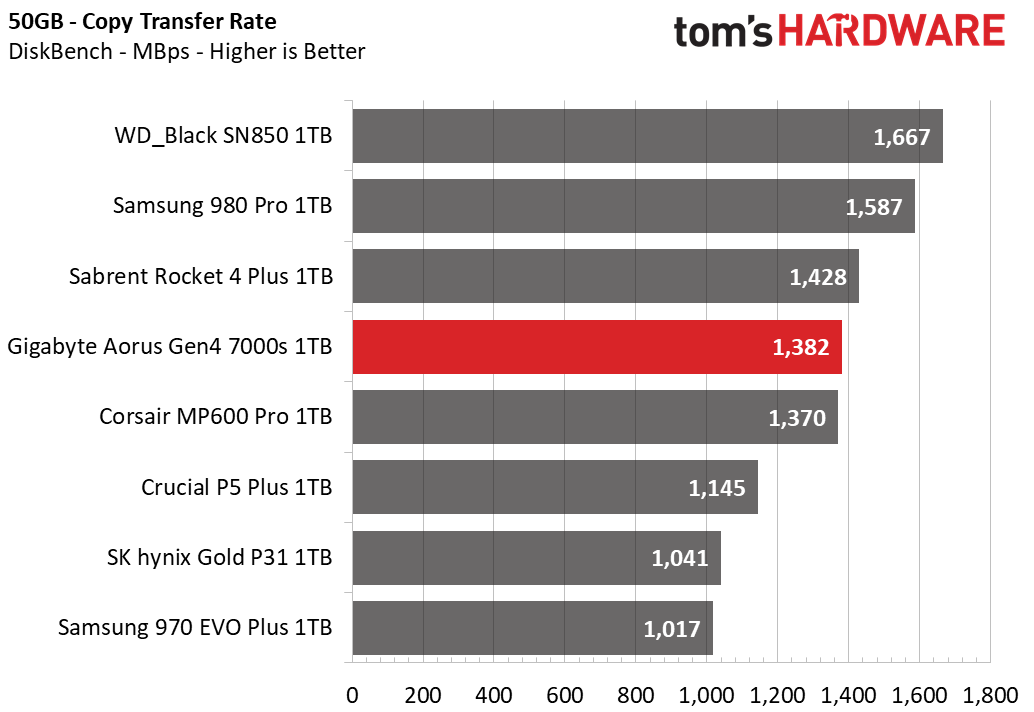
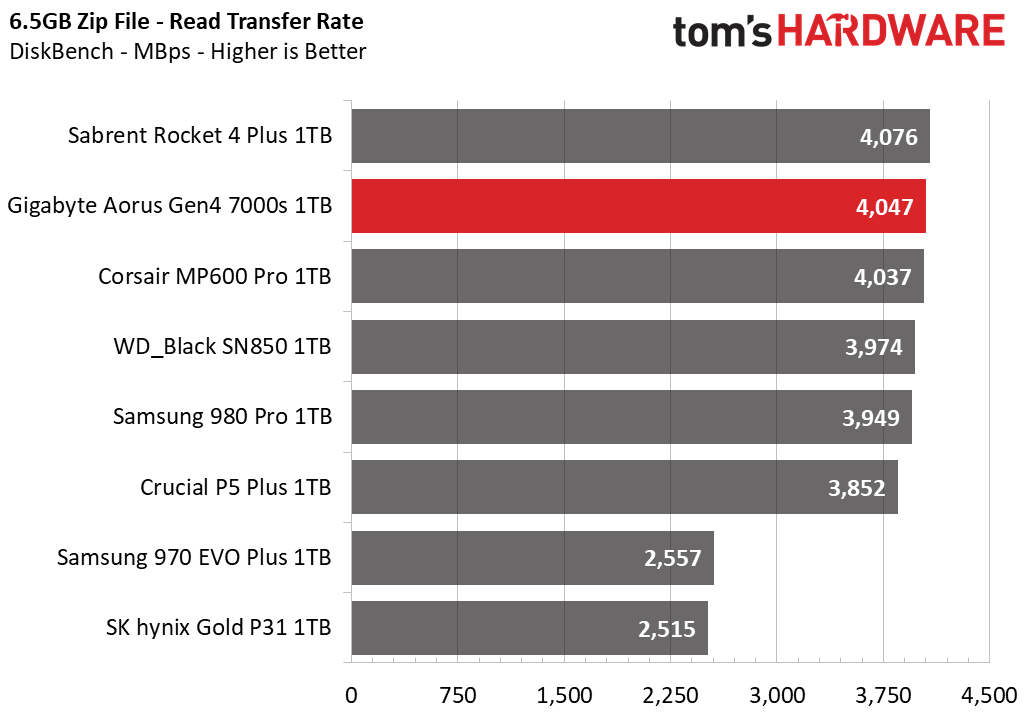
The Gen4 7000s delivered solid file copy results, but its results weren’t quite as impressive due to a bit slower random performance than the WD_Black SN850 or Samsung 980 Pro. However, the Gen4 7000s delivered one of the highest throughput results when tasked with reading back our large .zip file.
Trace Testing – PCMark 10 Storage Test
PCMark 10 is a trace-based benchmark that uses a wide-ranging set of real-world traces from popular applications and everyday tasks to measure the performance of storage devices. The quick benchmark is more relatable to those who use their PCs for leisure or basic office work, while the full benchmark relates more to power users.

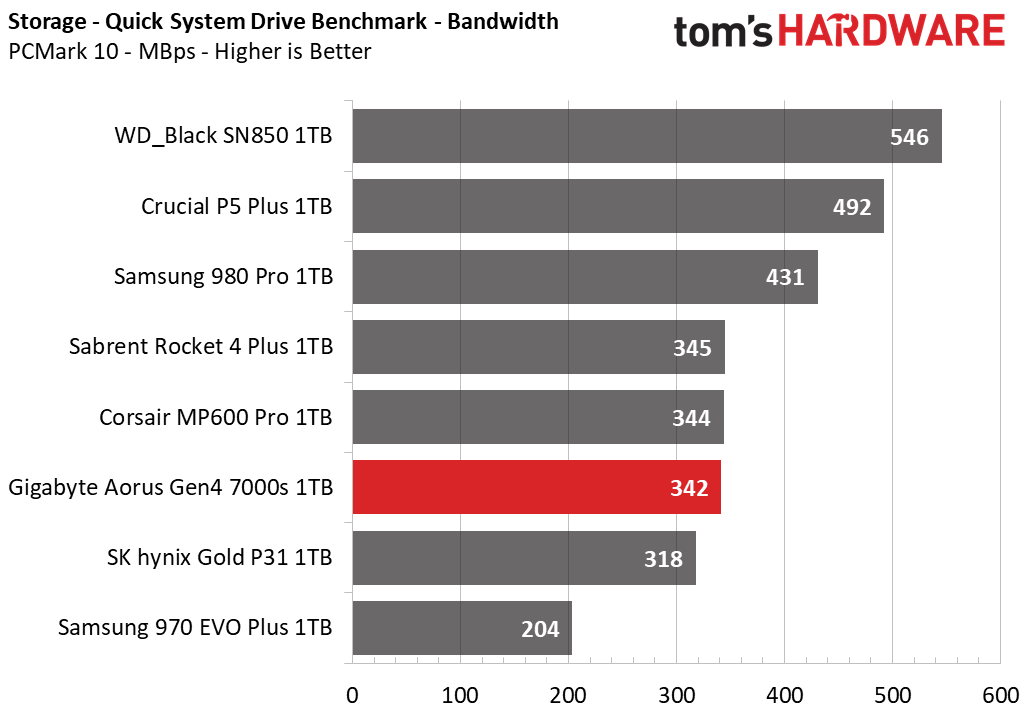
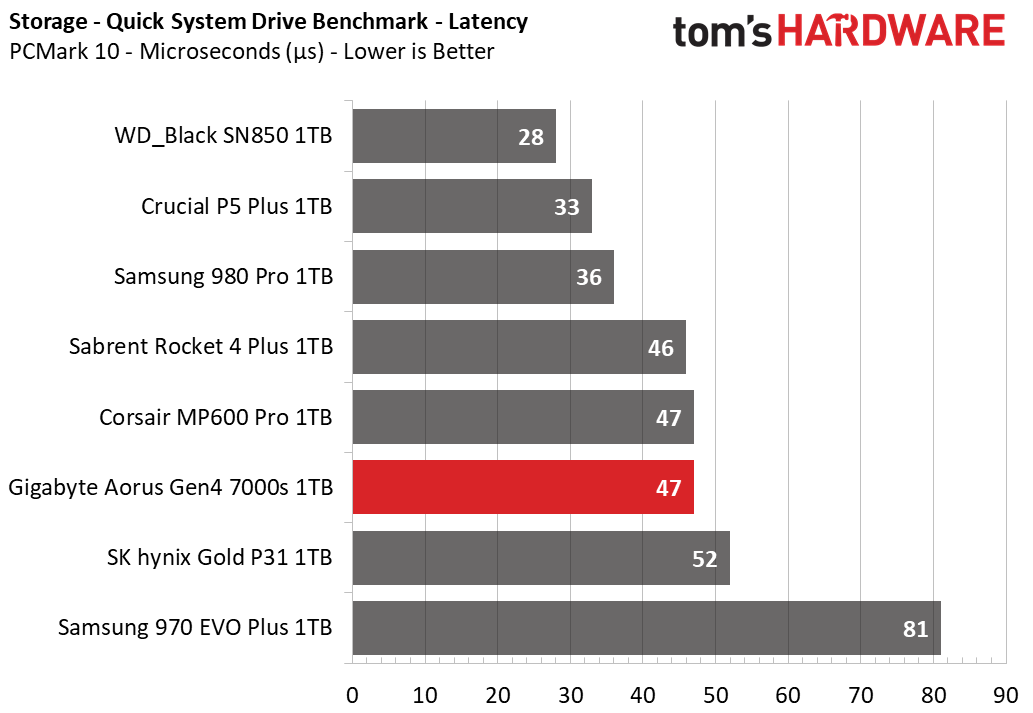
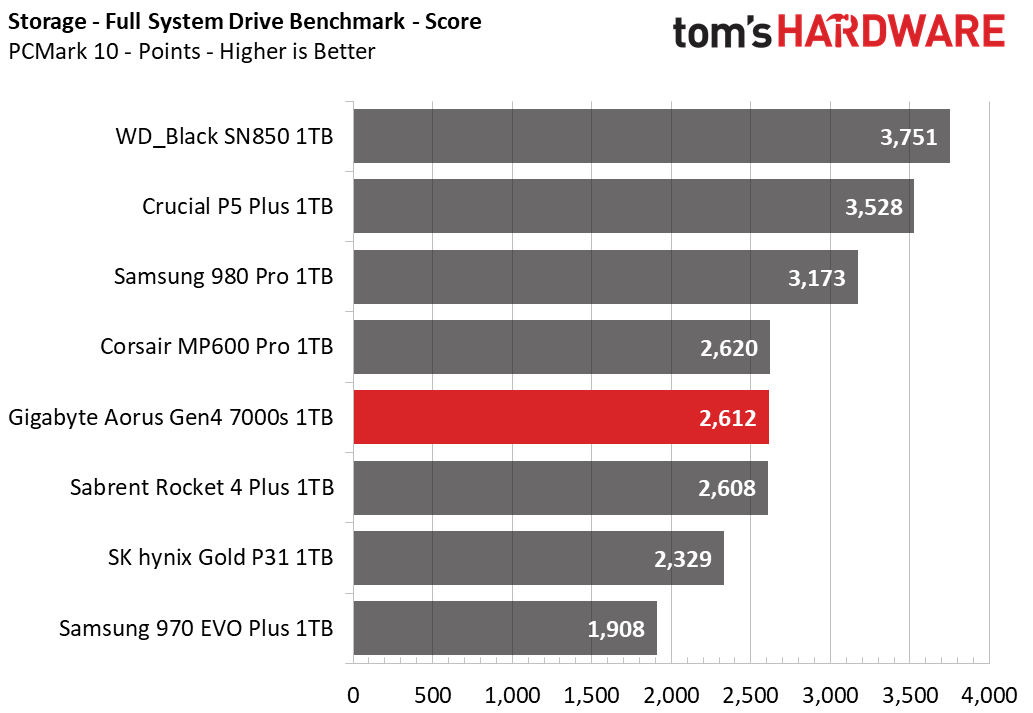
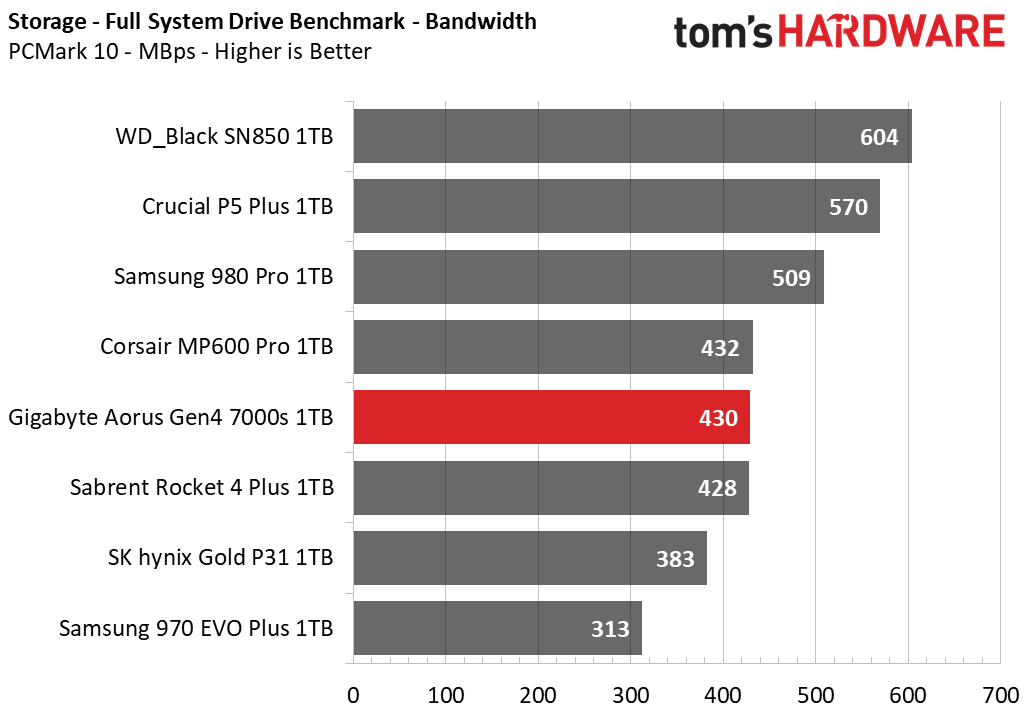
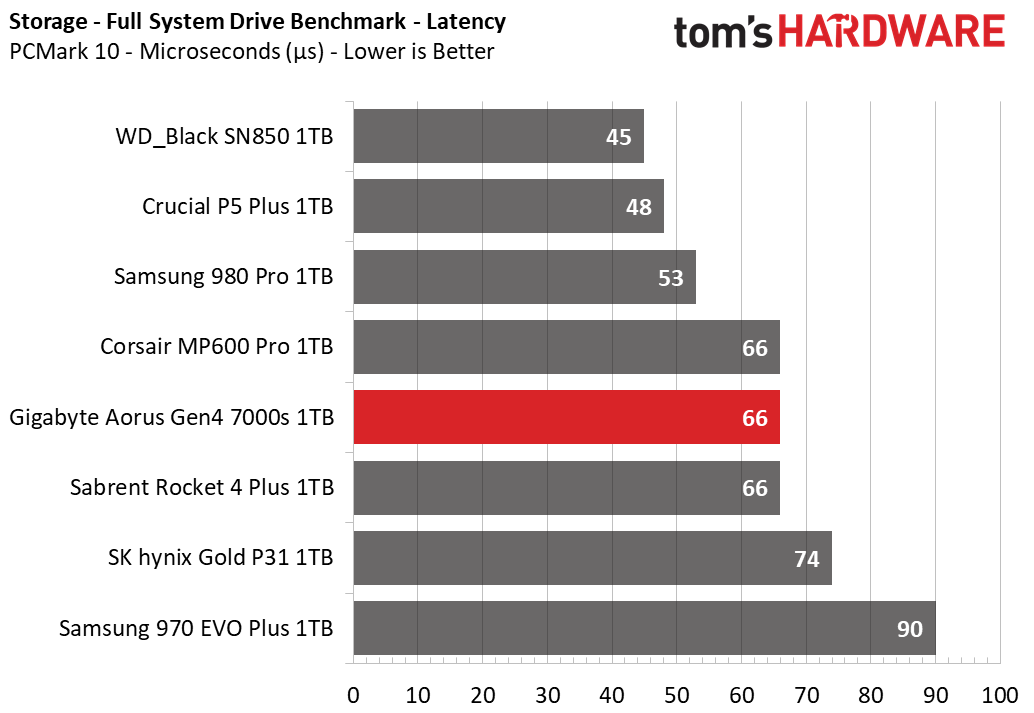
The Gen4 7000s outperformed the Gen3 competitors, but fell behind not only the Samsung 980 Pro and WD Black but also the Crucial P5 Plus in both the Quick System Drive and Full System Drive benchmarks. While it can deliver fast and responsive sequential speeds, its average performance in random workloads holds it back in this application.
Get Tom's Hardware's best news and in-depth reviews, straight to your inbox.
Synthetic Testing - ATTO / CrystalDiskMark
ATTO and CrystalDiskMark (CDM) are free and easy-to-use storage benchmarking tools that SSD vendors commonly use to assign performance specifications to their products. Both of these tools give us insight into how each device handles different file sizes.
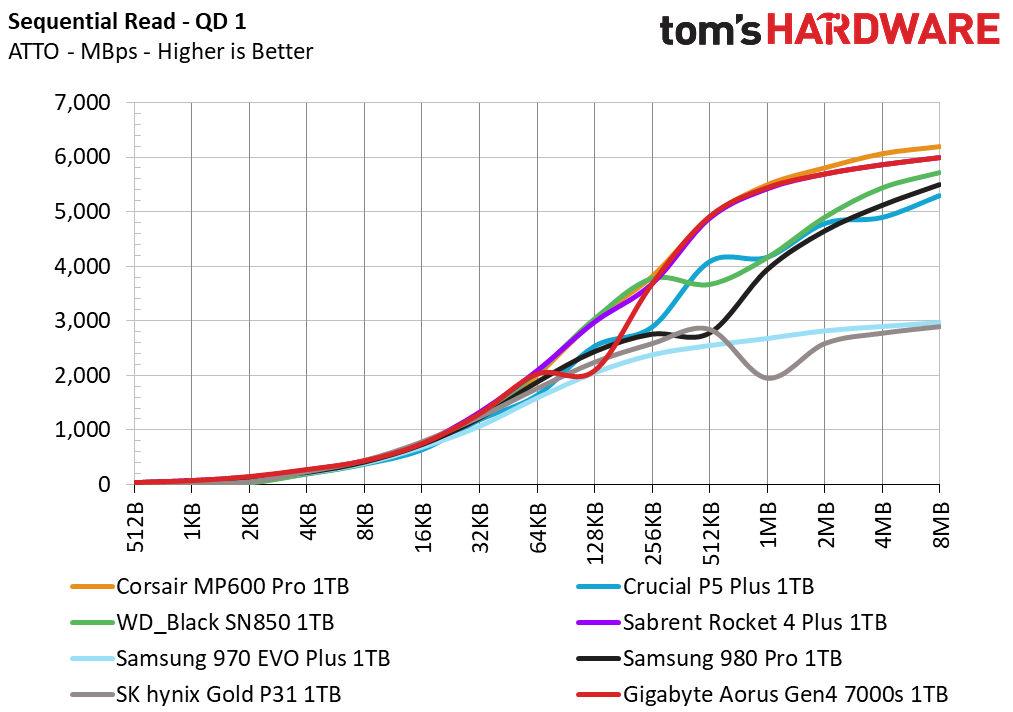
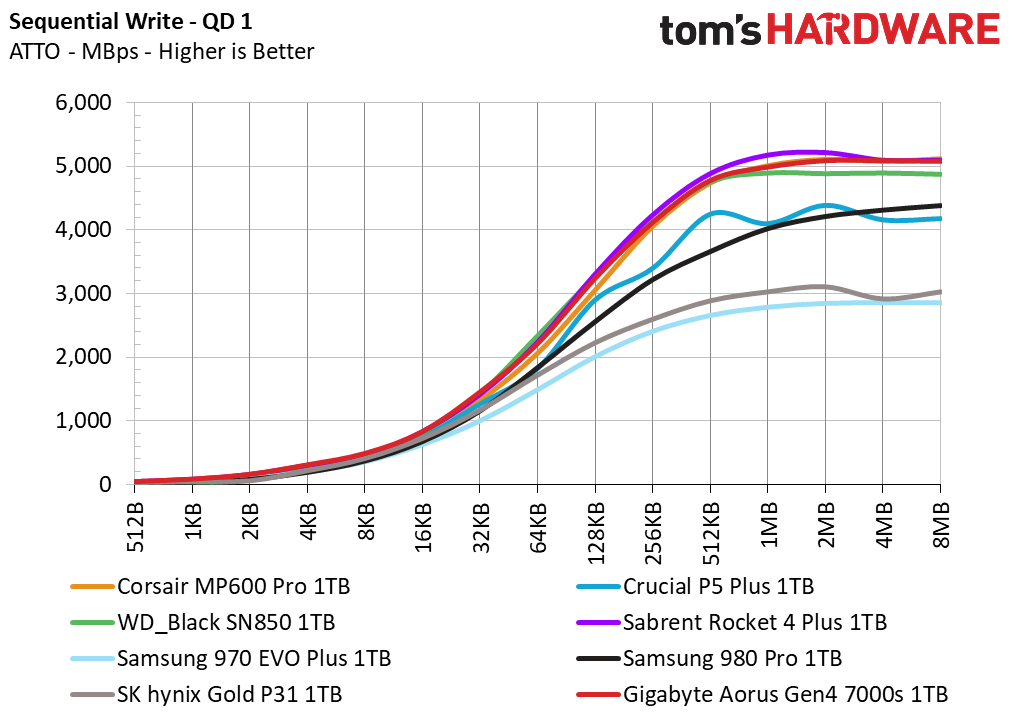
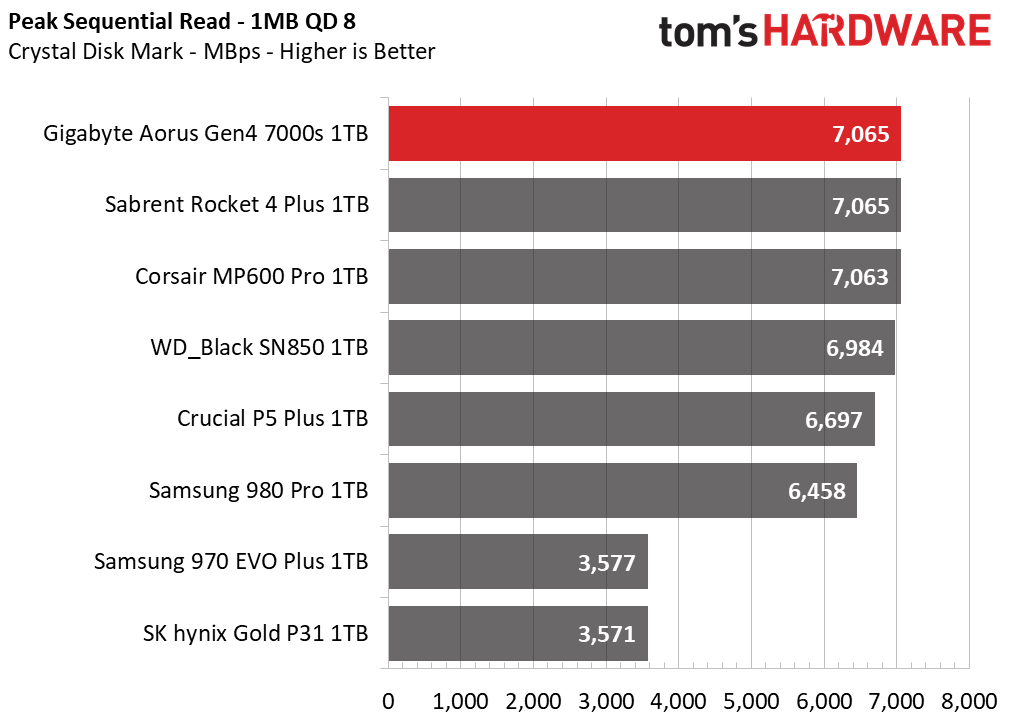
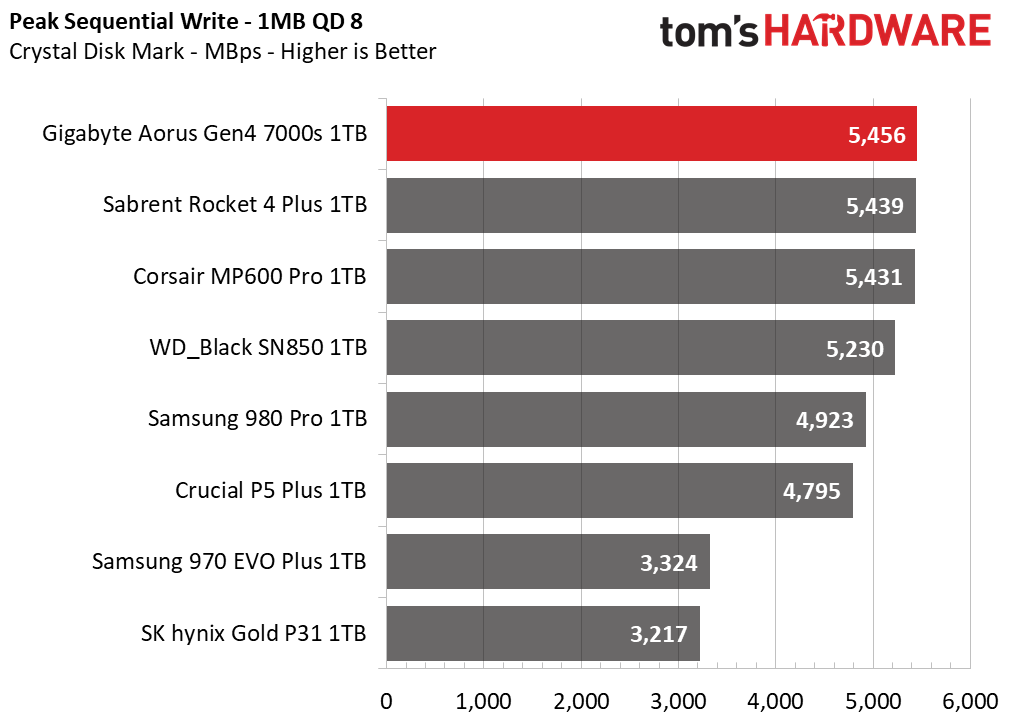
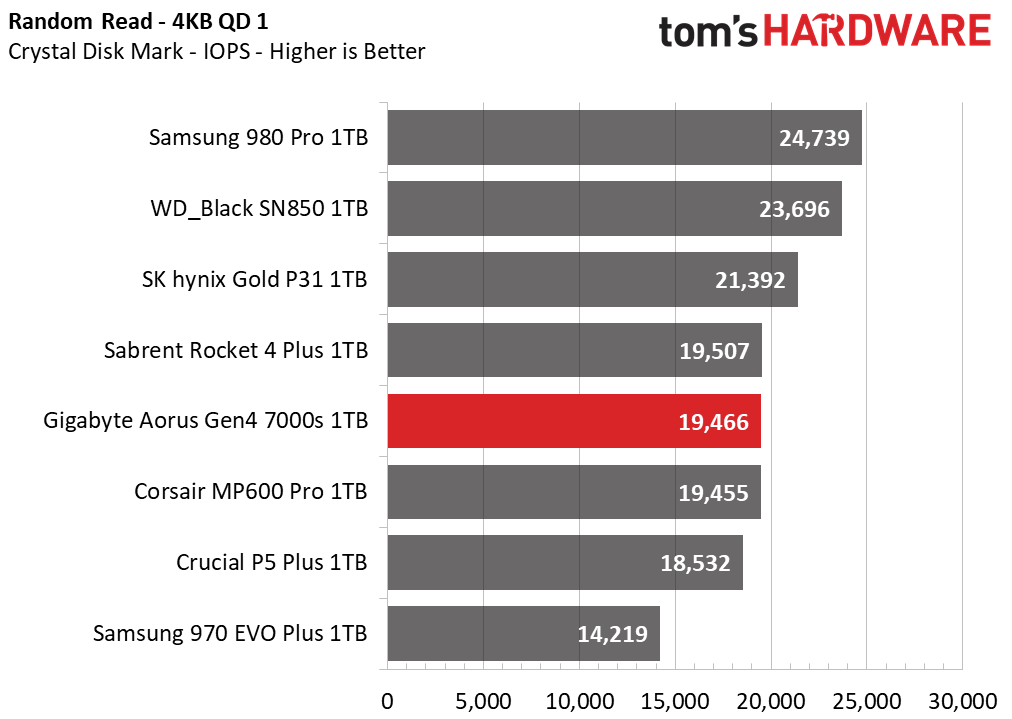
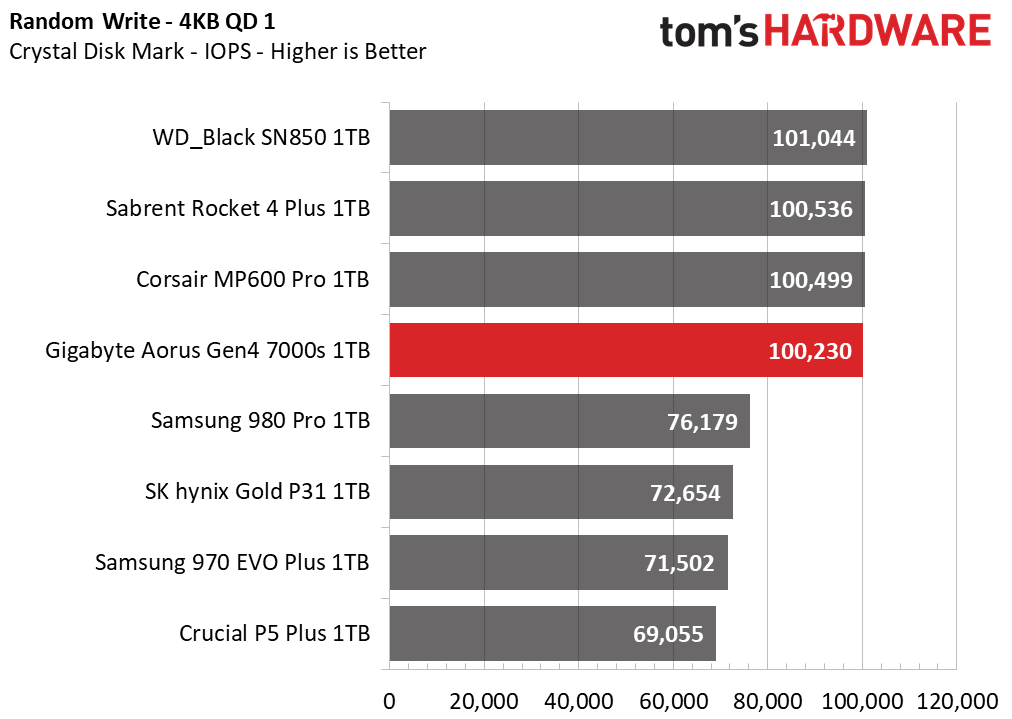
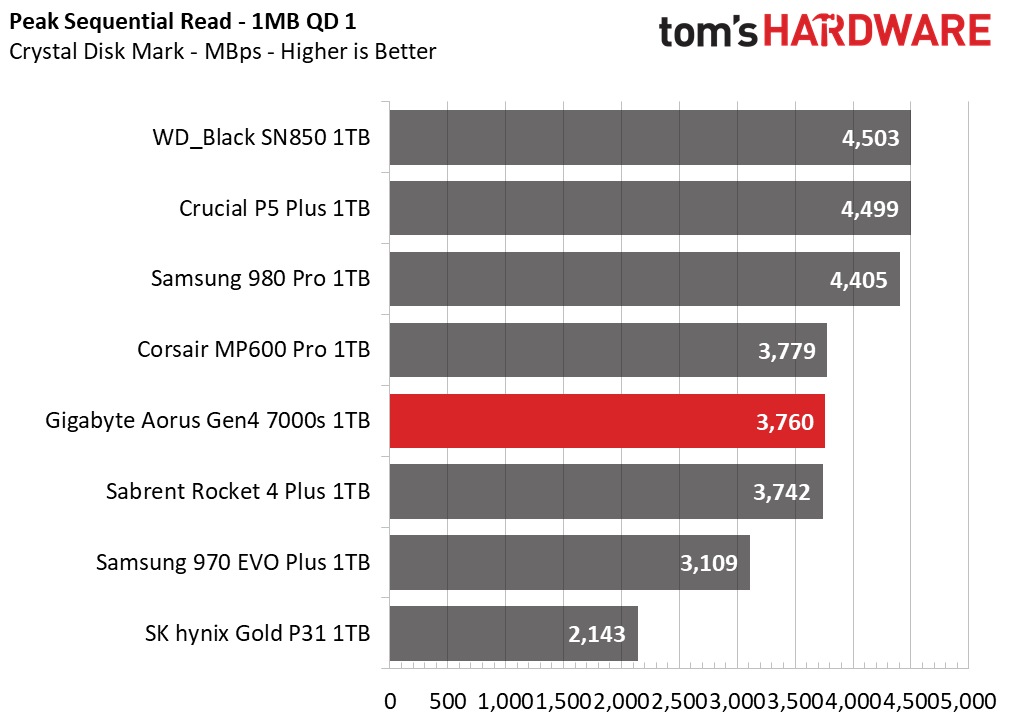
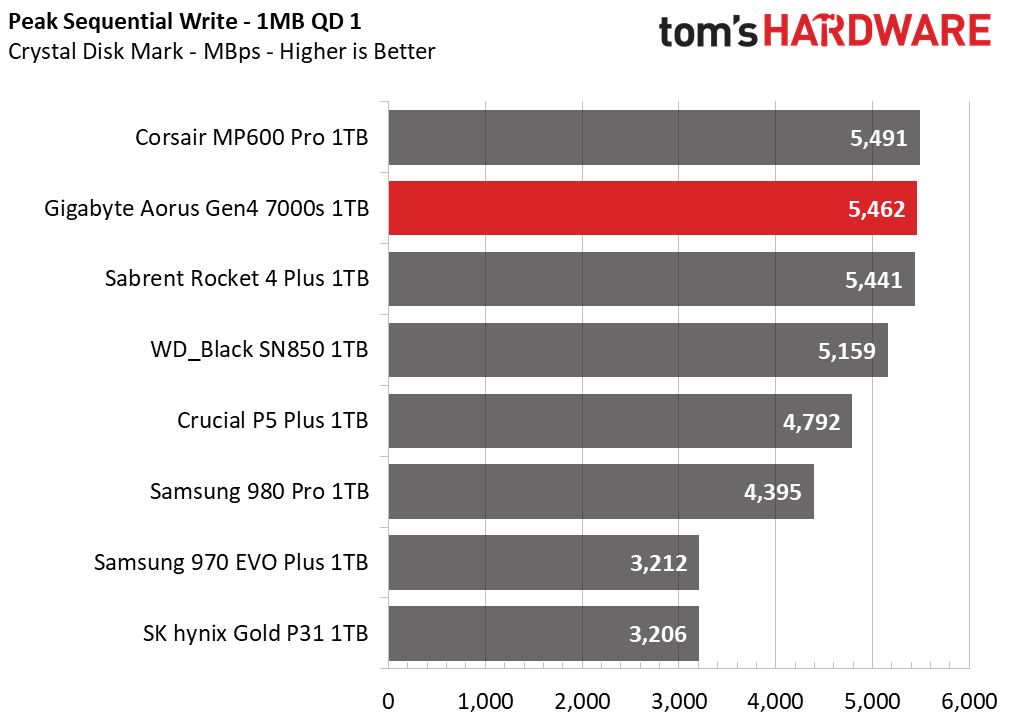
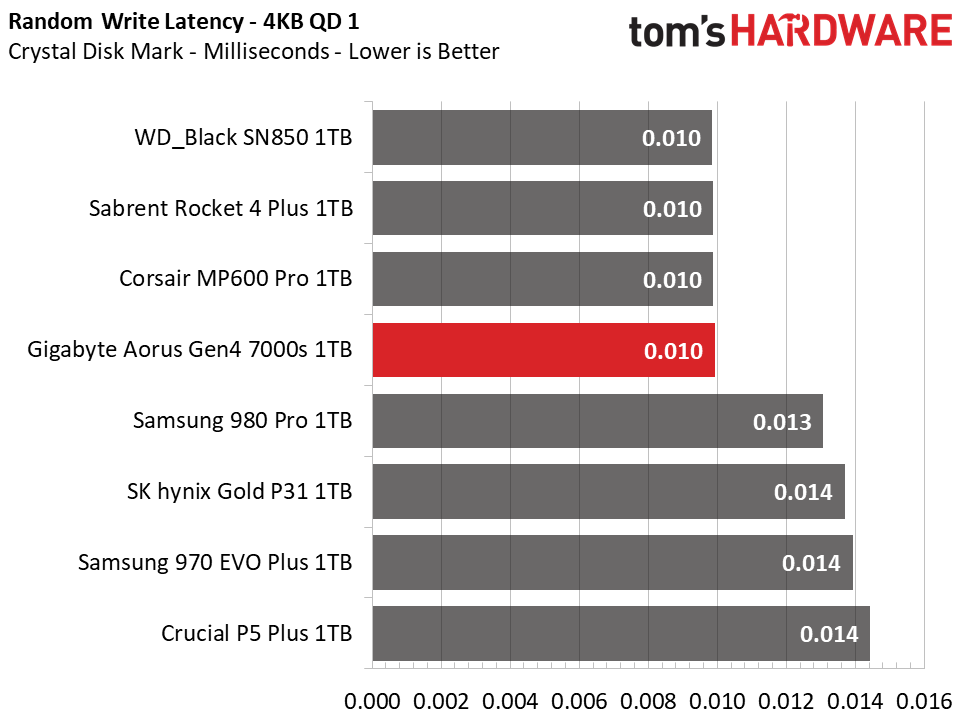
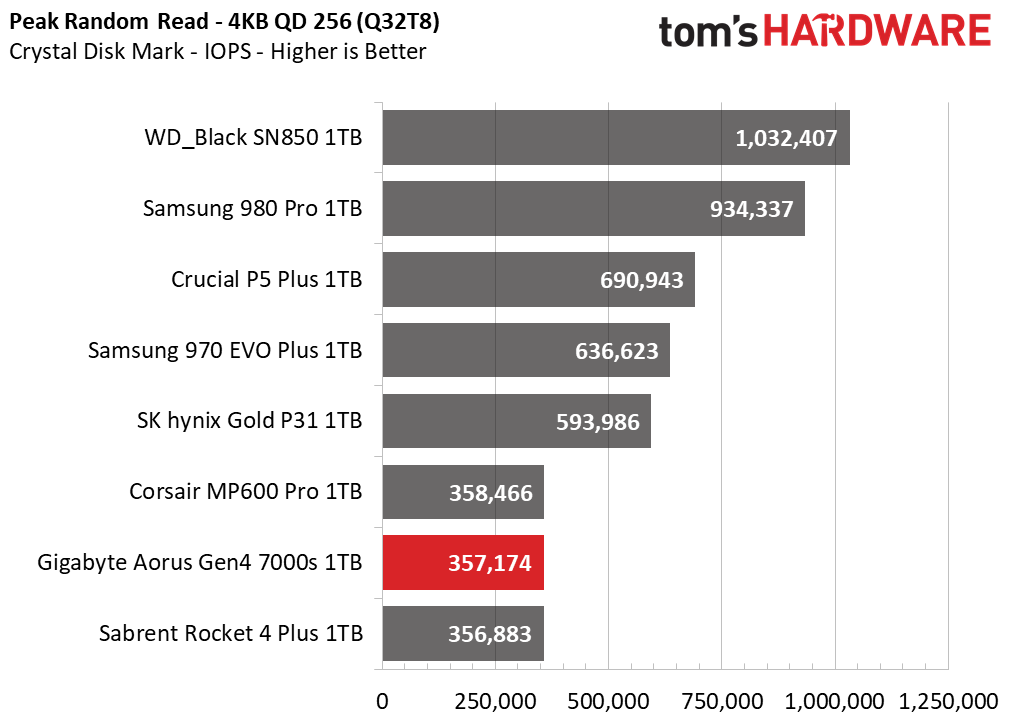
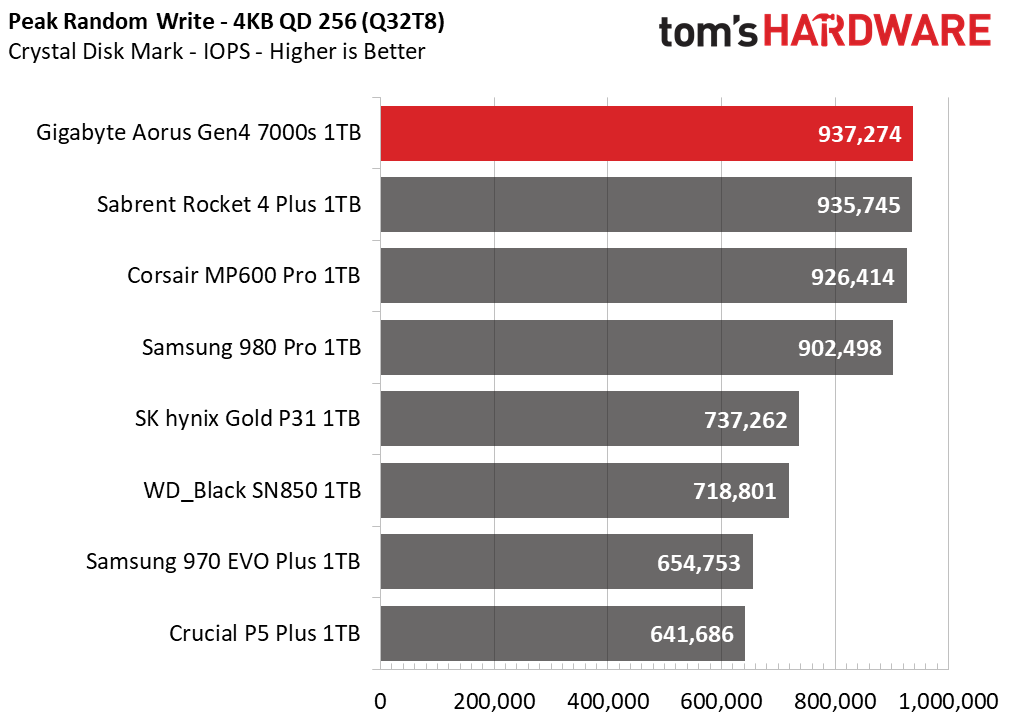
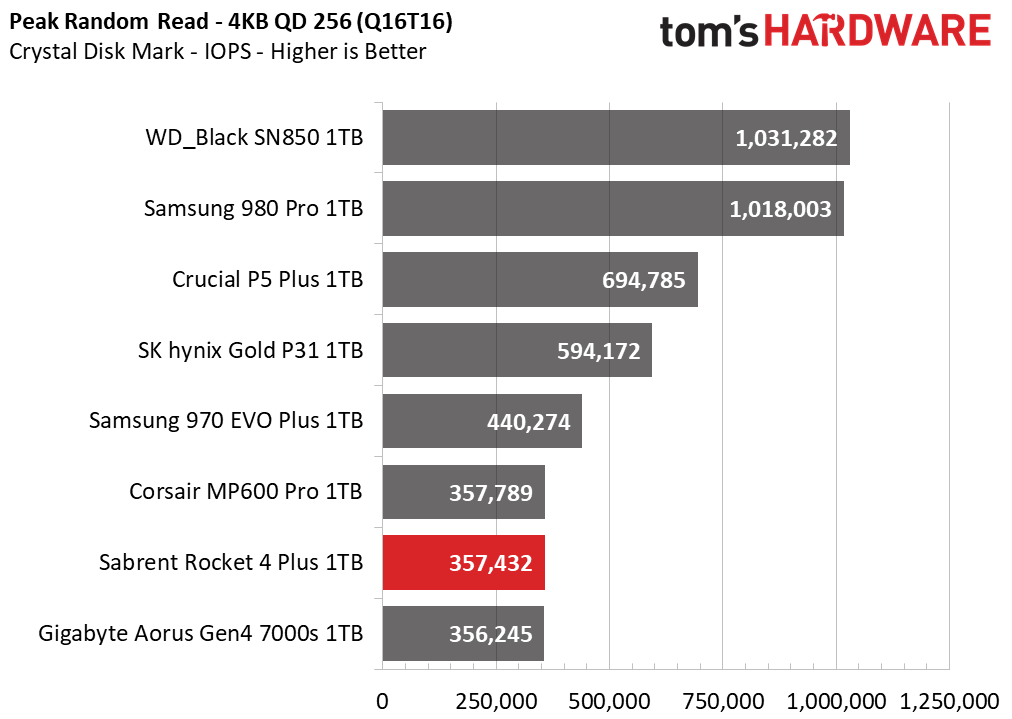
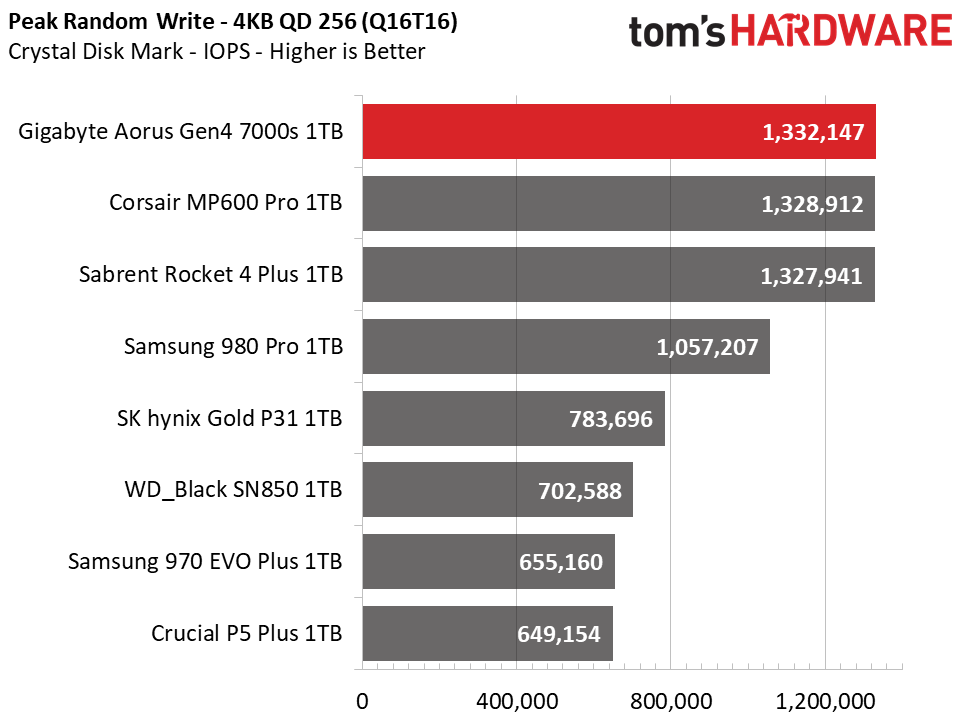
Gigabyte’s Aorus Gen4 7000s followed the same performance pattern as the other Phison E18-based competitors when testing out various block sizes in ATTO. It also topped the charts in CDM in terms of sequential throughput. Random write performance is a strong suit of the Gen4 7000s, but its random read speed could be improved.
Sustained Write Performance & Cache Recovery
Official write specifications are only part of the performance picture. Most SSDs implement a write cache, which is a fast area of (usually) pseudo-SLC programmed flash that absorbs incoming data. Sustained write speeds can suffer tremendously once the workload spills outside of the cache and into the "native" TLC or QLC flash. We use iometer to hammer the SSD with sequential writes for 15 minutes to measure both the size of the write cache and performance after the cache is saturated. We also monitor cache recovery via multiple idle rounds.
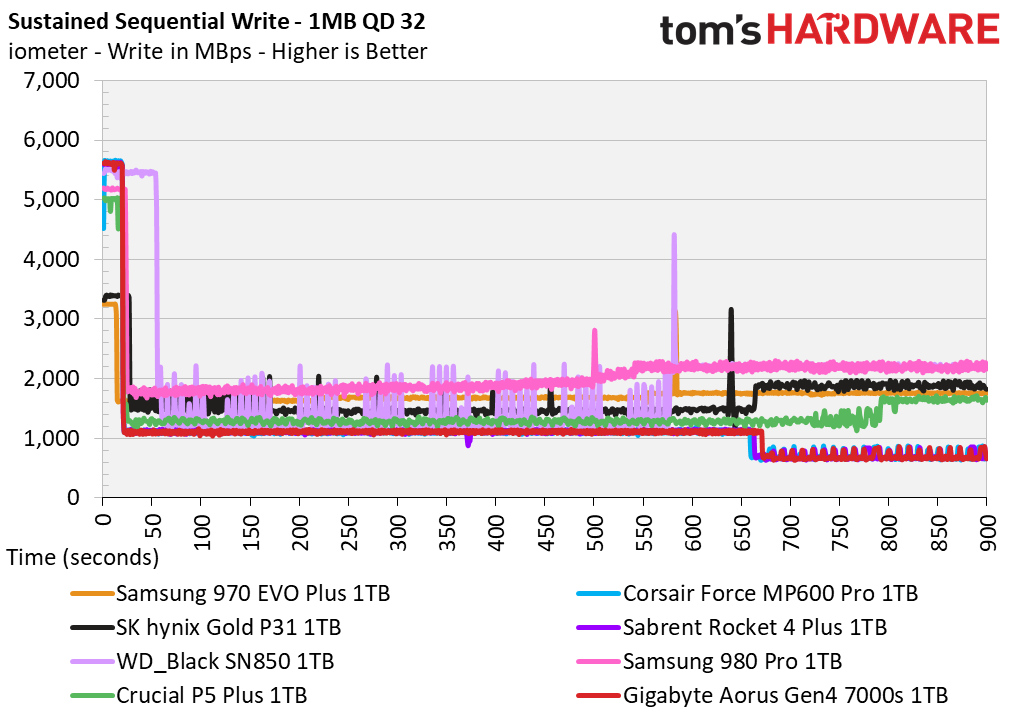
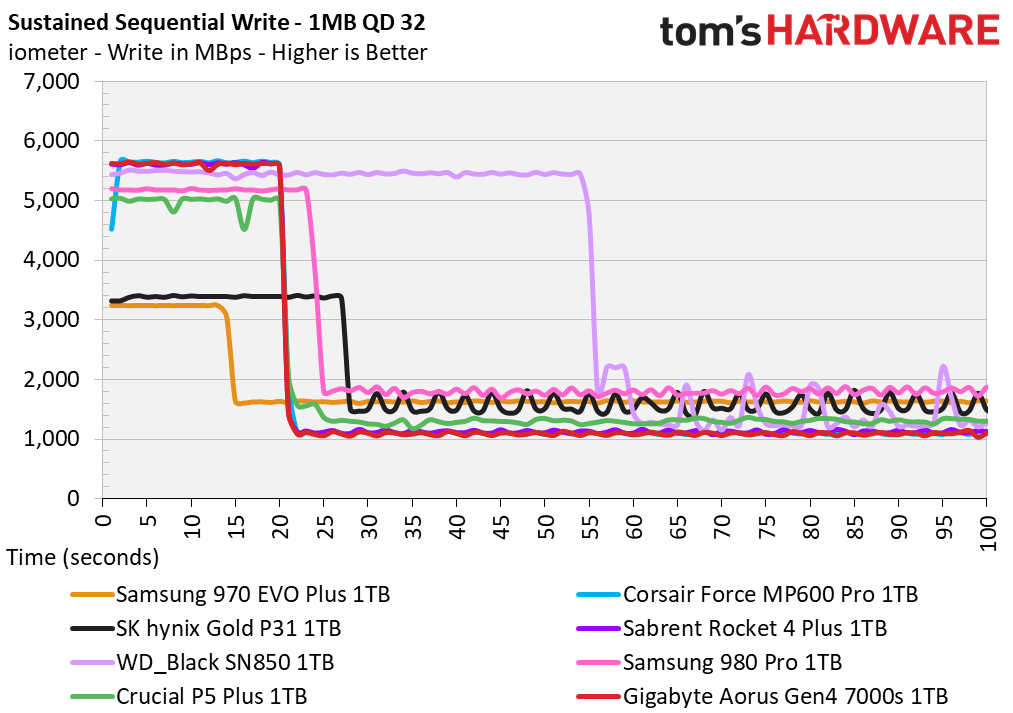
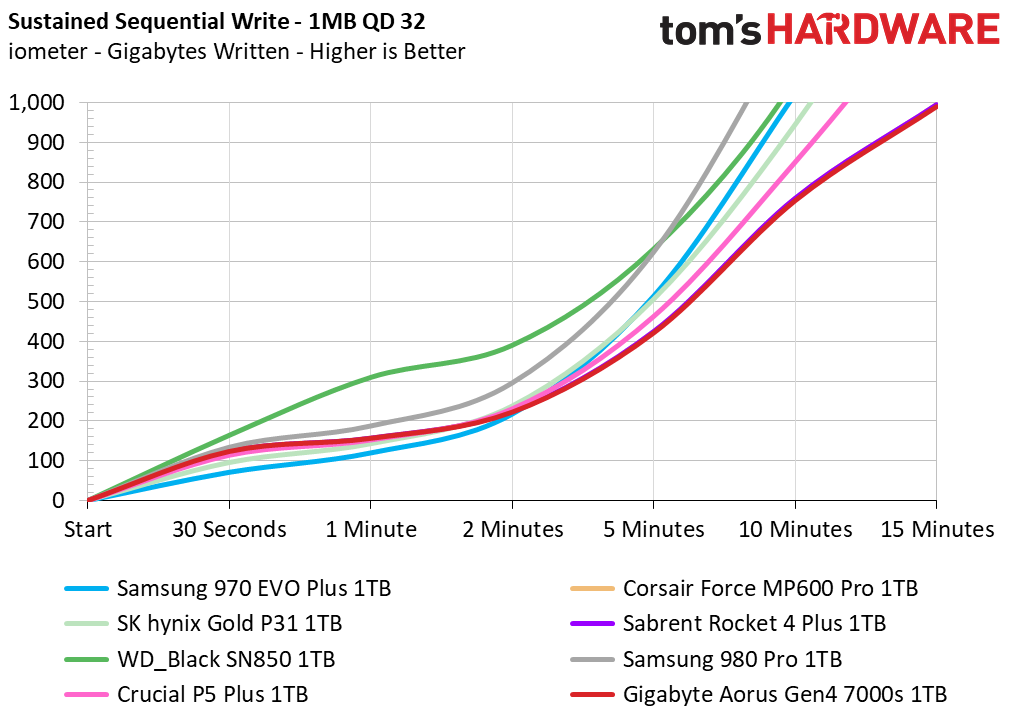
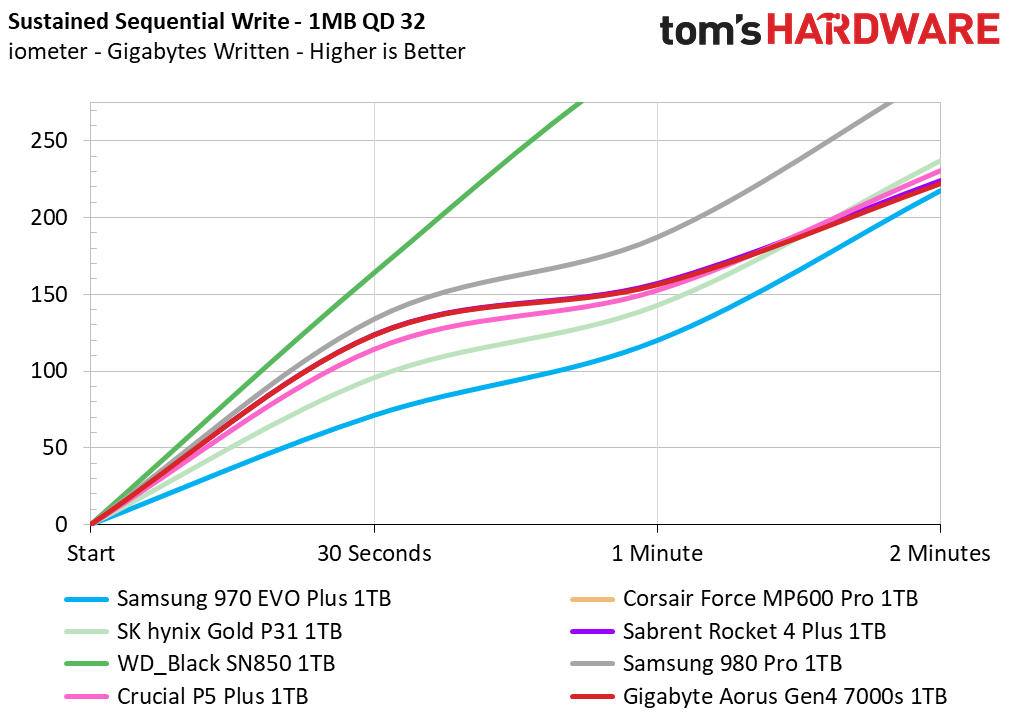
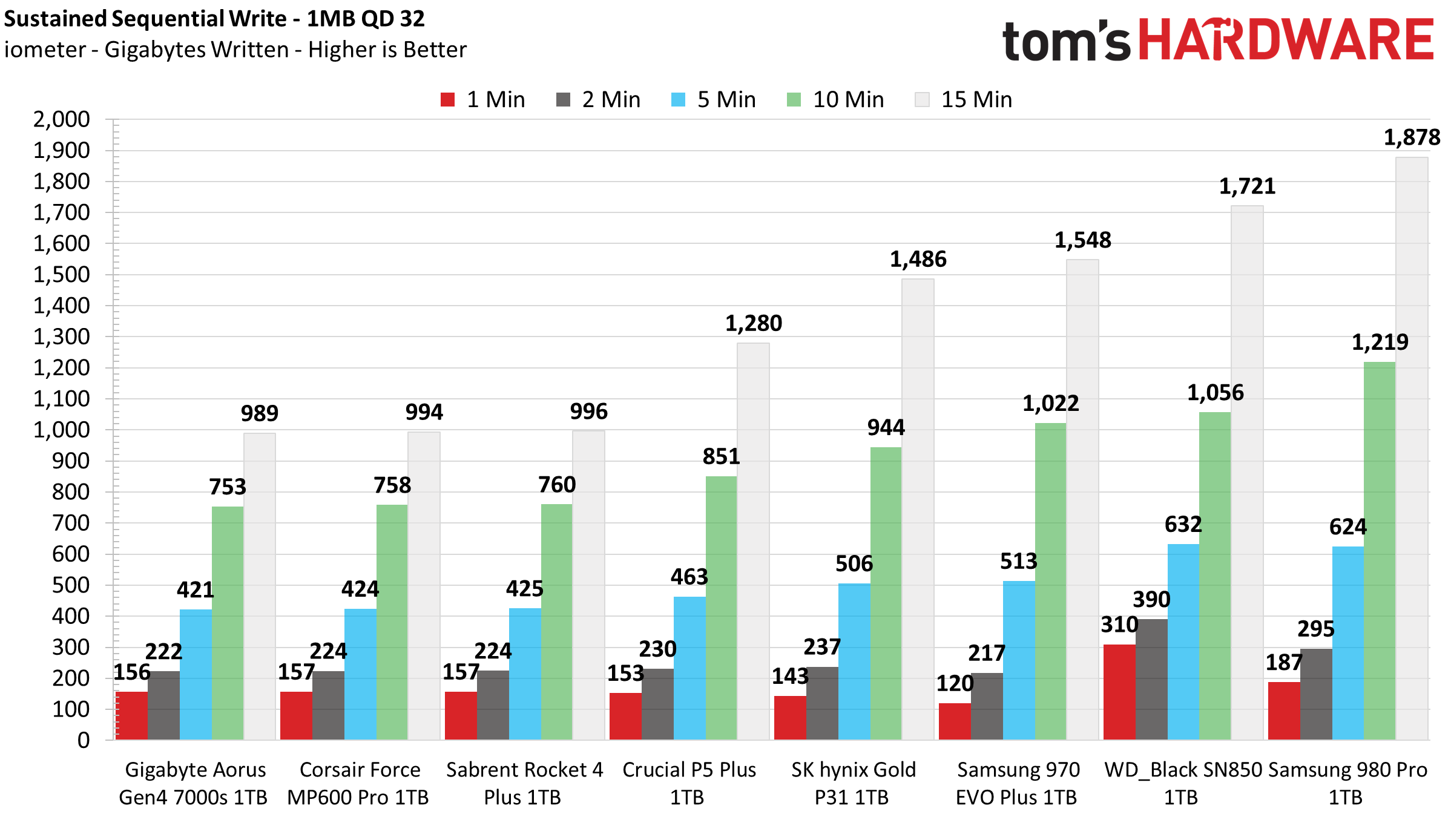
The Aorus Gen4 7000s delivered solid sequential write performance out of the gate but was no match for the Samsung 980 Pro or WD_Black SN850. After writing roughly 112GB of data at a rate of 5.6 GBps, sustained write performance degraded to 1.1 GBps. Around the 670 second mark, after writing just 831GB, the Gen4 7000s degraded once more to a slower speed of 690 MBps for the remainder of the test. It did not recover any of the SLC cache in our idle rounds that range up to 30 minutes. Instead, it continued to write at roughly 1.1GBps after each idle period.
Power Consumption and Temperature
We use the Quarch HD Programmable Power Module to gain a deeper understanding of power characteristics. Idle power consumption is an important aspect to consider, especially if you're looking for a laptop upgrade. Some SSDs can consume watts of power at idle while better-suited ones sip just milliwatts. Average workload power consumption and max consumption are two other aspects of power consumption, but performance-per-watt is more important. A drive might consume more power during any given workload, but accomplishing a task faster allows the drive to drop into an idle state more quickly, ultimately saving energy.
We also monitor the drive’s temperature via the S.M.A.R.T. data and an IR thermometer to see when (or if) thermal throttling kicks in and how it impacts performance. Bear in mind that results will vary based on the workload and ambient air temperature.
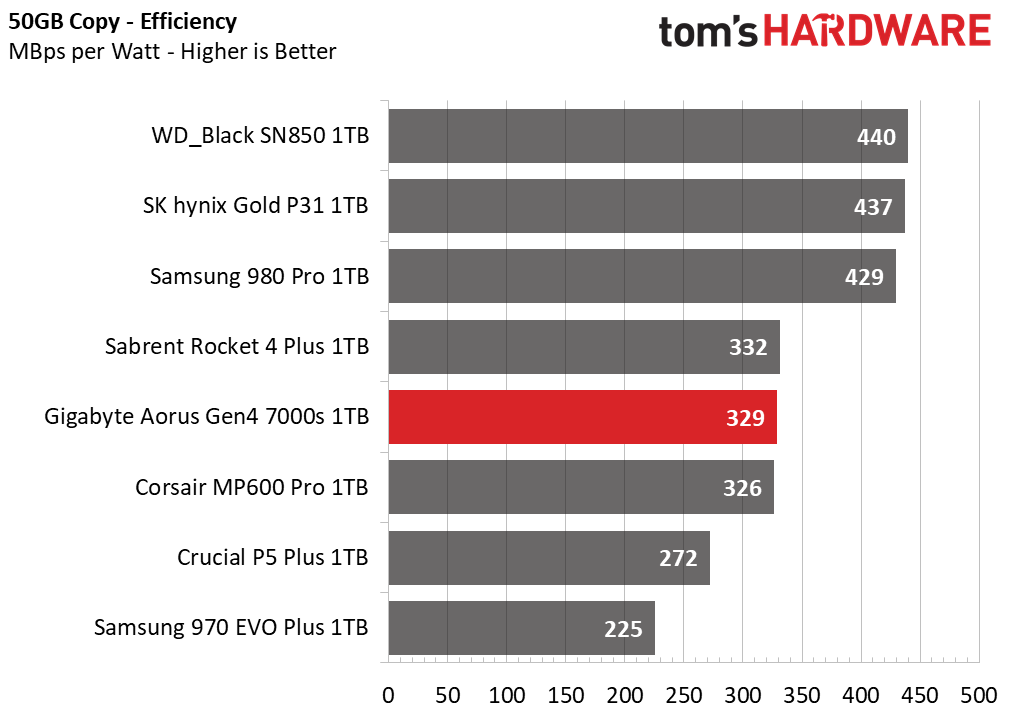
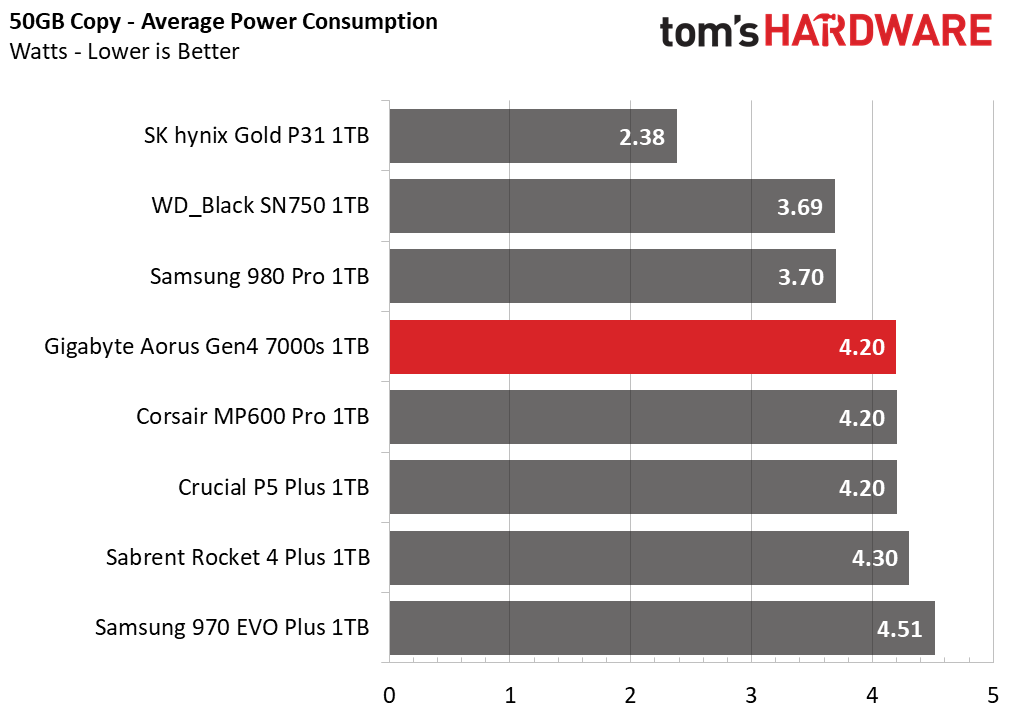
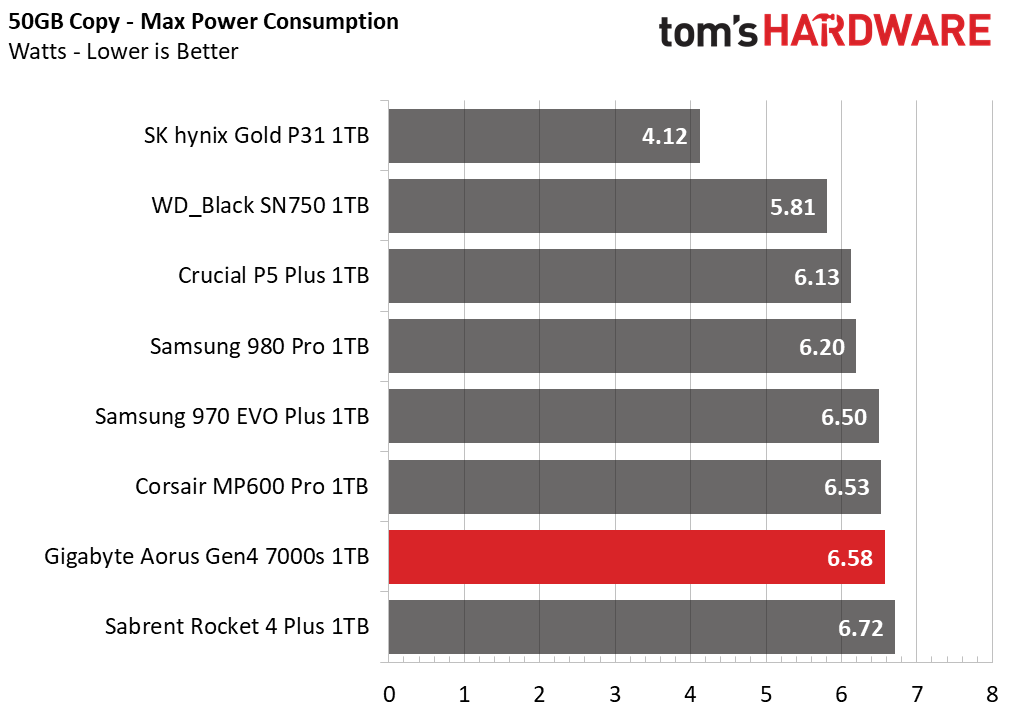
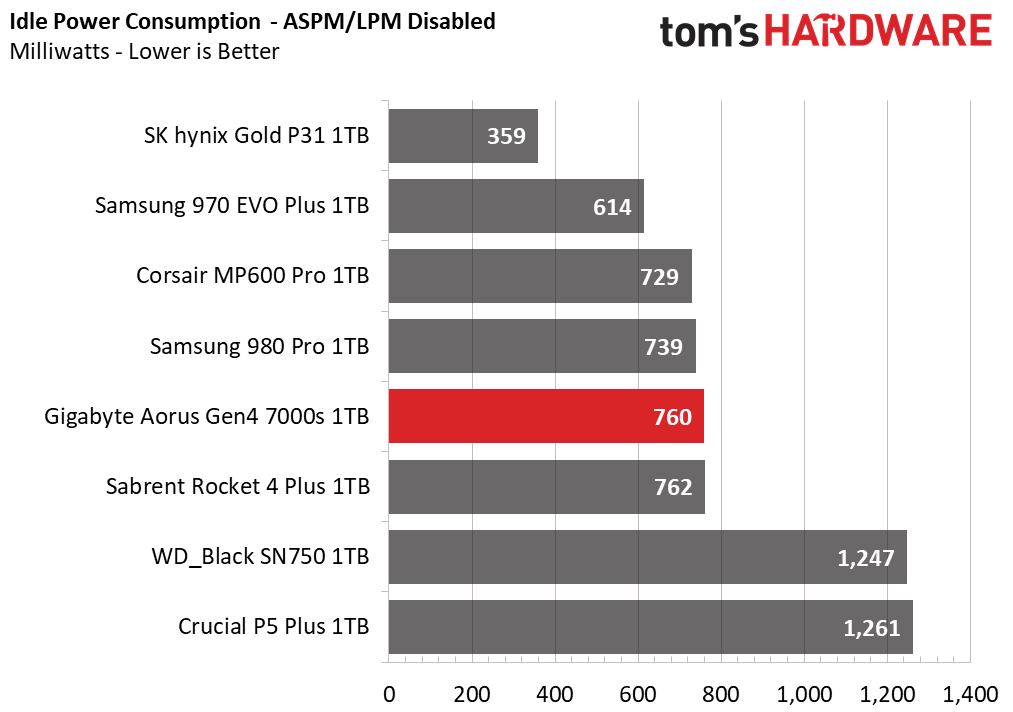
In terms of power efficiency, the Gen4 7000s scores higher than the Crucial P5 Plus and Samsung 970 EVO Plus, but isn’t quite as efficient as the best drives, lagging by a large margin due to its heavy power consumption.
At least the 7000s didn’t consume too much power at idle. At idle in a 24 degree Celsius room, the 7000s remained cool at around 30-33 degrees Celsius. Under load, the peak temperature at the heatsink surface measured roughly 56 degrees Celsius after transferring 500GB to the SSD from another NVMe SSD.
Test Bench and Testing Notes
| CPU | Intel Core i9-11900K |
| Motherboard | ASRock Z590 Taichi |
| Memory | 2x8GB Kingston HyperX Predator DDR4 5333 |
| Graphics | Intel UHD Graphics 750 |
| CPU Cooling | Alphacool Eissturm Hurricane Copper 45 3x140mm |
| Case | Streacom BC1 Open Benchtable |
| Power Supply | Corsair SF750 Platinum |
| OS Storage | WD_Black SN850 2TB |
| Operating System | Windows 10 Pro 64-bit 20H2 |
We use a Rocket Lake platform with most background applications such as indexing, windows updates, and anti-virus disabled in the OS to reduce run-to-run variability. Each SSD is prefilled to 50% capacity and tested as a secondary device. Unless noted, we use active cooling for all SSDs.
MORE: Best SSDs
MORE: How We Test HDDs And SSDs
MORE: All SSD Content
Current page: 1TB Performance Results
Prev Page Features and Specifications Next Page 2TB Performance Results
Sean is a Contributing Editor at Tom’s Hardware US, covering storage hardware.
-
waltc3 Don't quite get the "costly" remark...the GB 1TB is $10 more than the latest Amazon pricing for the 980 Pro 1TB; the 2TB 980 Pro is via Amazon $10 more than this GB. I don't see how "costly" qualifies. For its class of performance, cost seems right on the nose--but of course something slower will cost less, etc.Reply -
Makaveli "Gigabyte backs the Aorus Gen4 7000s with a 5-year warranty and each comes with respectable write endurance ratings - up to 700TB per 1TB in capacity. Such high endurance is thanks to Phison’s fourth-generation LDPC and RAID ECC, wear leveling, a bit of over-provisioning."Reply
Endurance has dropped on all these E18 drives compared to the E16 ones.
The E16 based drives at 1TB do 1,800 TBW which is more than the 2TB drive on E18. And E16 based 2TB drive does 3,600 TBW. And i've yet to see anyone ask them or get an explanation on why the endurance rating in less on new controller.
"But, even so, most consumers and prosumers will never come near to wearing out the Gen4 7000s with its endurance rating tipping the scales at 1.4PB at 2TB. "
That is a type-o there are no consumer drives with 1.4 PB of endurance that should be 1.4 TB
Also wonder if its just firmware tweaking on this drive that has it producing abit better scores than other E18 based drives. -
seanwebster Reply
Overall, I see both as quite costly in terms of price per GB.waltc3 said:Don't quite get the "costly" remark...the GB 1TB is $10 more than the latest Amazon pricing for the 980 Pro 1TB; the 2TB 980 Pro is via Amazon $10 more than this GB. I don't see how "costly" qualifies. For its class of performance, cost seems right on the nose--but of course something slower will cost less, etc.
It's probably because the flash runs faster, thus having a detrimental effect on endurance, or maybe just that Phison's sales teams are not offering that sort of contract anymore with this generation. Also worth noting, last gen came with BiCS flash, the current generation of E18 SSDs all come with Micron's 96L TLC. So, it may be even farther up the chain. Though, the newer flash will be out shortly. A few E18-based SSDs with Micron's 176L TLC are in the works.Makaveli said:Endurance has dropped on all these E18 drives compared to the E16 ones. The E16 based drives at 1TB do 1,800 TBW which is more than the 2TB drive on E18. And E16 based 2TB drive does 3,600 TBW. And i've yet to see anyone ask them or get an explanation on why the endurance rating in less on new controller.
Makaveli said:"But, even so, most consumers and prosumers will never come near to wearing out the Gen4 7000s with its endurance rating tipping the scales at 1.4PB at 2TB. "That is a type-o there are no consumer drives with 1.4 PB of endurance that should be 1.4 TB
It's not a typo. It has 1.4 petabytes of endurance, equal to 1,400 terabytes. I don't think any SSD has such low endurance as 1.4TB. Even consumer SSDs from 10 years ago came with 72TB endurance ratings.
I highly suspect so, too. More so now that I received another new batch of E18 drives this week and just started testing them today. They are also exhibiting similar performance improvement from what I can tell thus far.waltc3 said:Also wonder if its just firmware tweaking on this drive that has it producing abit better scores than other E18 based drives.
I still am having SLC cache measuring issues, though. Whenever I run the high QD sequential write test to these SSDs, once the SMART reports 70C, the drives pull back to that slower 1.8 GBps write speed around the 200-300GB mark. (This isn't the case when you do multiple drag and drops in real-world use in Windows. ) -
Makaveli Replyseanwebster said:Overall, I see both as quite costly in terms of price per GB.
It's probably because the flash runs faster, thus having a detrimental effect on endurance, or maybe just that Phison's sales teams are not offering that sort of contract anymore with this generation. Also worth noting, last gen came with BiCS flash, the current generation of E18 SSDs all come with Micron's 96L TLC. So, it may be even farther up the chain. Though, the newer flash will be out shortly. A few E18-based SSDs with Micron's 176L TLC are in the works.
It's not a typo. It has 1.4 petabytes of endurance, equal to 1,400 terabytes. I don't think any SSD has such low endurance as 1.4TB. Even consumer SSDs from 10 years ago came with 72TB endurance ratings.
I highly suspect so, too. More so now that I received another new batch of E18 drives this week and just started testing them today. They are also exhibiting similar performance improvement from what I can tell thus far.
I still am having SLC cache measuring issues, though. Whenever I run the high QD sequential write test to these SSDs, once the SMART reports 70C, the drives pull back to that slower 1.8 GBps write speed around the 200-300GB mark. (This isn't the case when you do multiple drag and drops in real-world use in Windows. )
Sorry yes you are correct i'm not use to see it written as 1.4PB on the consumer drives that does equal 1400 TBW.
I have been waiting to see the drives using Micron 176L TLC so will be keeping an eye on that.
I've been disappointed with some of the newer drives having very small SLC caches. The E16 Corsair drive i'm using has about a 333GB SLC cache. While the new E18 Corsair drive its smaller. And this seem to very per manufacturer.
Looking forward to more of your reviews and numbers. -
derekullo ReplyMakaveli said:"Gigabyte backs the Aorus Gen4 7000s with a 5-year warranty and each comes with respectable write endurance ratings - up to 700TB per 1TB in capacity. Such high endurance is thanks to Phison’s fourth-generation LDPC and RAID ECC, wear leveling, a bit of over-provisioning."
Endurance has dropped on all these E18 drives compared to the E16 ones.
The E16 based drives at 1TB do 1,800 TBW which is more than the 2TB drive on E18. And E16 based 2TB drive does 3,600 TBW. And i've yet to see anyone ask them or get an explanation on why the endurance rating in less on new controller.
"But, even so, most consumers and prosumers will never come near to wearing out the Gen4 7000s with its endurance rating tipping the scales at 1.4PB at 2TB. "
That is a type-o there are no consumer drives with 1.4 PB of endurance that should be 1.4 TB
Also wonder if its just firmware tweaking on this drive that has it producing abit better scores than other E18 based drives.
A 2 terabyte ssd with 1.4 terabytes of write endurance.
Also known as a 1.4 terabyte SSD-R :p -
Sleepy_Hollowed Hm... were it not for the current increase in prices when availability drops, if I can find these at the prices listed when that happens, that'd OK pricing.Reply
Either would be a nice game drive honestly, not so much an OS + game drive if you do other stuff on the background.
If gigabyte keeps up with the firmware updates for security for those 5 years, then it's a decent drive. Not that Windows supports bitlocker hardware encryption anymore, but for other operating systems hardware AES-256 is mighty fine.
